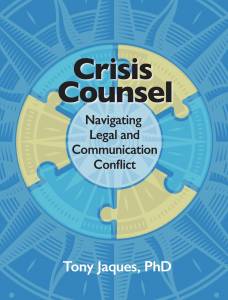When should corporates take a stand on high-profile social issues?
by Tony Jaques Ph.D., Director of Issue Outcomes Pty. Ltd. and author of Crisis Counsel: Navigating Legal and Communication Conflict
The likely overthrow of Roe v Wade to limit access to abortion in the United States has highlighted whether and when business corporations should take a stand on controversial high-profile social issues. Denim company Levi Strauss was one of the first major companies to weigh in on this debate, defining it as “a critical business issue.”
The company said efforts to further restrict or criminalize access to the full range of reproductive health care, including abortion, “would have far-reaching consequences for the American workforce, the US economy, and our nation’s pursuit of gender and racial equity.”
Stressing the business impact, their statement said research showed legal access to abortion leads to higher educational attainment, labour force participation, and earnings, and that women who don’t have access to abortion are more likely to leave the workforce.
Levi Strauss has a record supporting controversial high-profile social issues, including gun violence, yet such corporate advocacy is not without risk.
For example, a YouGov study in the US showed that, while more than half of millennials supported brands taking a stance on social issues, 59% of adults said they would boycott a brand if they disagreed with its public position on a particular issue.
Moreover, a new survey by the Brunswick Group suggests that corporate executives “vastly overestimate” the importance of speaking on social issues. Although 63% of corporate executives “agree unequivocally that companies should speak out on social issues” only 36% of voters feel the same.
So, how to navigate through this sometimes no-win morass of uncertainty, contradiction, and risk?
Business relevance for high-profile social issues
A company with a consumer brand, such as food or clothing, or cosmetics, is more likely to have an impact than one with no public profile, for example, producing generic raw materials for other manufacturers. And a trucking company, which uses large amounts of non-renewable fuel, is more likely to have credibility advocating climate change than campaigning on domestic violence.
Corporate consistency
Assess your position very carefully. It’s not just a matter of “address the issues our stakeholders care about.” Is this aligned with your core values and management commitment? Think no further than John Gibson, CEO of American videogame maker Tripwire, who praised the Supreme Court late last year for upholding abortion restrictions in Texas. With a key business partner cutting ties, Gibson was forced to resign. Management said: “His comments disregarded the values of our whole team, our partners, and much of our broader community.” Ouch!
Saying nothing about a high-profile social issue can speak volumes
Meantime, saying nothing, or very little, can in fact be saying something. Consider when Disney, the largest private employer in Florida, made a non-committal response to the State Governor’s ”Don’t Say Gay” bill designed to limit gender discussion in schools. Following a walkout by LGBTQI employees, Disney CEO Bob Chapek firmly denounced the plan and told staff: “You needed me to be a stronger ally in the fight for equal rights and I let you down. I am sorry”
Pick your social issues
Can we make a difference? Do we want to stand out from the pack? How many issues should we champion? Do we risk appearing opportunistic or unauthentic? Be selective and choose with care.
Actions versus words
Most importantly, public words need to be supported by real actions. Levi Strauss didn’t just talk about Roe v Wade but joined other companies providing travel and expense benefits for employees seeking an abortion. Similarly, in the face of anti-vaccine activism, Australian companies such as Amazon and Woolworths paid employees to get vaccinated or provided pop-up clinics on site.
Finally, recognise this challenge isn’t going away anytime soon. In fact, a report by USC Annenberg found that 90% of communicators expect increased commitment to social change and 55% expect an increase in purpose-driven campaigns. The question is: Are you prepared?
A Parting Thought
To do nothing is to be nothing (Anon)
Tony Jaques is an EXPERT in crisis response, communication and reputation management. Navigating through a communication conundrum is not always easy! You can learn more about Reputation Risk, Cybersecurity Risk, and Crisis communication in his NEW book, Crisis Counsel: Navigating Legal and Communication Conflict.
“Crisis Counsel confirms Tony Jaques position as one of the industry’s foremost experts on issues and crisis management. In addressing the complex interactions between legal and communication crisis responses Dr. Jacques provides riveting case studies and practical advice. It highlights the financial and reputation risks of not effectively integrating communications and legal counsel. It should be on every communications practitioner’s reading list and companies should insist their in-house and external legal counsellors read it.” – Noel Turnbull, Former Chair of Turnbull Porter Novelli, Adjunct Professor, RMIT University.
“Senior managers who find themselves in the C-suite for the first time, Crisis Counsel should be mandatory reading. Such specific legal and communications provocations are not covered in university management courses, and the introduction is replete with illuminating case studies and key takeaways. The author provides sage advice for Chief Executives who must ultimately make a decision based upon what they think is the right thing to do; often under pressure. Crisis team leaders and team members will find this book equally of value, as the more you know about it, the better you and the team will be.” – Jim Truscott, Director, Jim Truscott & Associates Pty Ltd, Perth, Australia
“For far too long, the role of lawyers in crisis management has been neglected. If discussed at all, it is often in negative terms. Tony Jaques adjusts this picture in masterly, yet eminently readable terms. His comprehensive discussion of apology in crisis management is likely to be a go-to source for years to come. This is a welcome book for anyone interested in how crisis-confronted corporations (and other organizations, too) can navigate the tricky legal waters of communicating under fire. For university teachers like me, it’s a rich source of well-researched case studies. A gem!” – Chris Galloway, PhD, Head of Pubic Relations, Massey University of New Zealand

